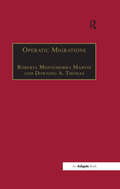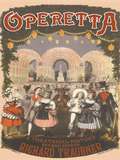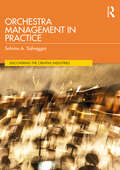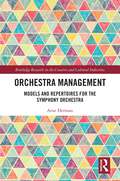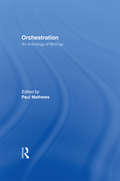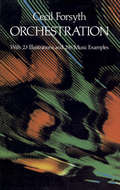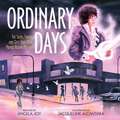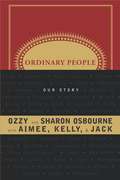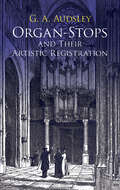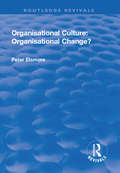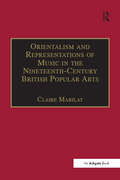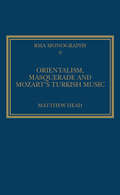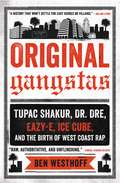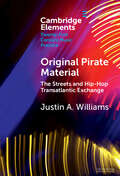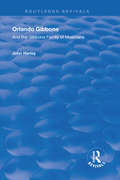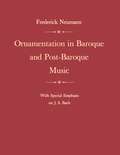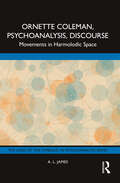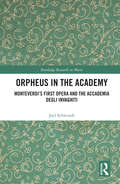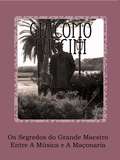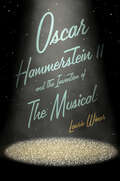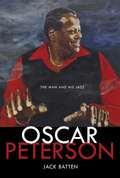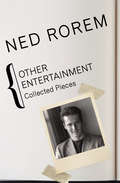- Table View
- List View
Operatic Migrations: Transforming Works and Crossing Boundaries
by Roberta Montemorra Marvin Downing A. ThomasThis volume takes an interdisciplinary approach to studying a wide range of subjects associated with the creation, performance and reception of 'opera' in varying social and historical contexts from the eighteenth to the twentieth centuries. Each essay addresses migrations between genres, cultures, literary and musical works, modes of expression, media of presentation and aesthetics. Although the directions the contributions take are diverse, they converge in significant ways, particularly with the rebuttal of the notion of the singular nature of the operatic work. The volume strongly asserts that works are meaningfully transformed by the manifold circumstances of their creation and reception, and that these circumstances have an impact on the life of those works in their many transformations and on a given audience's experience of them. Topics covered include transformations of literary sources and their migration into the operatic genre; works that move across geographical and social boundaries into different cultural contexts; movements between media and/or genre as well as alterations through interpretation and performance of the composer's creation; the translation of spoken theatre to lyric theatre; the theoretical issues contingent on the rendering of 'speech' into 'song'; and the transforming effects of aesthetic considerations as they bear on opera. Crossing over disciplinary boundaries between music, literary studies, history, cultural studies and art history, the volume enriches our knowledge and understanding of the operatic experience and the works. The book will therefore appeal to those working in the field of music, literary and cultural studies, and to those with a particular interest in opera and musical theatre.
Operetta: A Theatrical History
by Richard Traubner"Operetta: A Theatrical History" is considered the classic history of this important musical theater form. Traubner's book, first published in 1983, is still recognized as the key history of the people and productions that made operetta a worldwide phenomenon. Beginning in mid-19th century Europe, the book covers all of the key developments in the form, including the landmark works by Strauss and his followers, Gilbert & Sullivan, Franz Lehar, Rudolf Friml, Victor Herbert, and many more. The book perfectly captures the champagne-and-ballroom atmosphere of the greatest works in the genre. It will appeal to all fans of musical theatre history.
Orchestra Management in Practice (Discovering the Creative Industries)
by Salvino A. SalvaggioIntroducing the business models, organisational structures, and fundamentals of orchestras, this book takes readers on a journey through the evolution of orchestra management. The author explores the dynamics between artistic excellence and financial sustainability. Key aspects of orchestra management are examined in detail, including artistic programming, strategic planning, financial and compliance/legal matters, audience development, resilience and adaptability, governance and board relations, diversity and inclusion, partnerships, and the role of technology and innovation. With actionable resources, such as checklists, templates, and frameworks, for current and future orchestra leaders and managers, this comprehensive guide empowers readers in education and practice to navigate the complexities of orchestra management confidently and effectively.
Orchestra Management: Models and Repertoires for the Symphony Orchestra (Routledge Research in the Creative and Cultural Industries)
by Arne HermanEvery orchestra in the world oscillates between crisis and survival. This perpetual movement makes innovation, both in organizational form and in artistic product, vital to the sustainability of the symphony orchestra. Based on case study research in Flanders, Amsterdam and London, this book reflects on the sustainability crisis of the orchestra by framing it as a legitimacy crisis that affects both the orchestra’s artistic and organizational identity. The aim of this book is to explore the dynamics between various and often conflicting factors in the orchestra’s quest for survival, and to show how these organizational dynamics relate to the orchestra’s repertoire. By highlighting the importance of every organization’s specific environment to which it needs to adapt, this book illustrates that the orchestra field is not a field that relies on best practices. The book reflects on conventional as well as innovative orchestra models, making the comparative point of view relevant for academic or practice-based researchers, orchestra managers, policymakers and subsidizing bodies interested in sustainable and future-oriented orchestra management.
Orchestration: An Anthology of Writings
by Paul MathewsOrchestration: An Anthology of Writings is designed to be a primary or ancillary text for college-level music majors. Although there are several 'how to' textbooks aimed at this market, there is little available that traces the history of orchestration through the writings of composers themselves. By collecting writings from the ninenteenth century to today, Mathews illuminates how orchestration has grown and developed, as well as presenting a wide variety of theories that have been embraced by the leading practitioners in the field. The collection then traces the history of orchestration, beginning with Beethoven's Orchestra (with writings by Berlioz, Wagner, Gounod, Mahler, and others), the 19th century (Mahler, Gevaert, Strauss) the fin de siecle (on the edge of musical modernism; writings by Berlioz, Jadassohn, Delius, and Rimsky Korsakov), early modern (Busoni, Schoenberg, Stravinsky, Grainger, and others), and high modern (Carter, Feldman, Reich, Brant). Many of these pieces have never been translated into English before; some only appeared in small journals or the popular press and have never appeared in a book; and none have ever been collected in one place. The study of orchestration is a key part of all students of music theory and composition. Orchestration provides a much needed resource for these students, filling a gap in the literature.
Orchestration: Music Book Index (Dover Books on Music)
by Cecil Forsyth"For its time the most comprehensive treatment of the subject." -- New Grove Dictionary of Music and MusiciansBefore the 17th century, composers seldom indicated in their music whether the composition was to be performed by a particular combination of voices or instruments. Then in 1607 Monteverdi made a well-known suggestion for the orchestration of his opera Orfeo. And as the Baroque era unfolded, the concept of orchestrations began to evolve, achieving a notable clarity and the acceptance of a keyboard instrument as an integral part of the ensemble.Toward the middle of the 18th century, stylistic changes in instrumental music, e.g. styles that emphasized a single melodic line, directly affected methods of orchestration; while in the 19th century, orchestrations became an ever more vital factor in the composer's technique, a stylistic determinant that places a wealth of possibilities at his disposal. Finally, in the early 18th century, increasing awareness of the importance of internal balance, certain ideals of blended sound, and firmly established instrumental characteristics enabled orchestration to take its place as an academic discipline beside harmony and counterpoint.In this classic manual, a noted English composer describes 57 orchestral instruments (ca. 1914) tracing their origins, development, and status at the beginning of World War I. Not only are the history and evolution of each instrument fully discussed, the author also explores the techniques of each instrument, as well as players' impressions about what they must play. The result is an unparalleled insight into the inner working of an orchestra -- a vivid impression of what it is like to be a violinist, clarinetist, trombonist, or other orchestral player.While there have been numerous developments in instrumental technique on an individual basis since the book's first publication, most of what Forsyth says is still valid. Writing with wit, grace, and good sense, Forsyth created a formidably thorough, comprehensive, and informative text that has instructed and influenced generations of composers, conductors, musicians, and musicologists.
Ordinary Days: The Seeds, Sound, and City That Grew Prince Rogers Nelson
by Angela JoyA rhythmic, striking picture book biography of legendary singer/songwriter/performer Prince.Before he became a legend, he was just a boy… On an ordinary day, you could see him. A young boy named Prince Rogers Nelson, who had parents who fought, nowhere to call home, and a collection of memories turned into sound: the shouts of anger, the purr of pigeons, the roar of cars down a busy Minneapolis street, and the whisper of cold wind on budding lilac bushes. Other sounds joined in as he taught himself to play the guitar, piano, drums, and much more, leading to the day this ordinary boy began to make music—and became extraordinary. Black Is a Rainbow Color and Choosing Brave author Angela Joy’s exquisite words harmonize with acclaimed illustrator Jacqueline Alcántara’s sweeping art to create a tender, profound look into music icon Prince's early life and the moments that shaped him.Ordinary Days also includes an extensive author’s note and playlist of recommended Prince songs suitable for young listeners.
Ordinary People
by Family OsbourneIn their own words (and we all know how colorful those can be), the five members of the notorious Osbourne clan tell the amazing story of the first family of rock. OZZY talks about his first beer, his legendary career,and why he's the only sane member of the Osbourne family. SHARON explains the root of her shopaholic nature, the ups and downs of being married to Ozzy, and what it's like to battle cancer and host a talk show. AIMEE reveals why she opted out of MTV's The Osbournes, why she thinks her mother's in denial, and why her father destroyed himself with drugs. KELLY offers cutting thoughts on sibling relationships and growing up Osbourne as well as on life as a fledgling rock star. JACK shares stories about life without privacy ("What's privacy?") and his stint in rehab -- and claims he's the only sane one in the family. IF YOU THOUGHT YOU ALREADY KNEW THE OSBOURNES, THINK AGAIN!
Organ-Stops and Their Artistic Registration (Dover Books On Music: Instruments)
by George Ashdown AudsleyThis 1921 classic by a renowned organ builder provides organists and all those interested in the instrument with a guide to its numerous stops, among them bassoon, bass tuba, cymbal, double trumpet, oboe, piccolo, viola da gamba, and xylophone. The text supplies various names of each stop in different languages, traces their origins, and describes their construction, tonal characteristics, and value in artistic combination and registration. A fascinating book about the "Monarch of all Instruments" for students, teachers, and professional musicians. A "must-have" for the organist's library. Introduction by Rollin Smith. 5 plates of illustrations.
Organisational Culture: Organisational Change? (Routledge Revivals)
by Peter ElsmoreThis title was first published in 2001. When organizational change occurs, members of the organization can feel insecure in the face of a seemingly uncertain future. This work investigates the links between organizational culture and organizational change by looking at two businesses that have been privatized - British Gas and British Telecom - and the processes surrounding the ways these organizations changed in the mid 1990s. It includes interviews with middle-ranking and senior officals, illustrating that anguish is experienced not only by those on the lower rungs of the corporate ladder.
Organising Music
by Nic Beech Charlotte GilmoreOrganisational theorists have become increasingly interested in the creative industries, where practices that are commonplace are of particular interest to organisations in other sectors as they look for new ways to enhance performance. Focusing on the music industry, this book sets up a unique dialogue between leading organisational theorists and music professionals. Part I explores links between organisation theory and the creative industries literature, concentrating on practices of organising and knowledge mobilisation, followed by an in-depth discussion of key theoretical concepts by subject experts. Part II provides a diverse range of 'tales from the field', including examples from classical orchestras, folk, indie and punk. The concluding chapter examines the shared dialogue to reveal what practice in the musical field can learn from organisational theory, and vice versa. This innovative book will interest graduate students and researchers in the fields of organisation studies, music management and the creative industries.
Orientalism and Musical Mission: Palestine and the West
by Rachel Beckles WillsonOrientalism and Musical Mission presents a new way of understanding music's connections with imperialism, drawing on new archive sources and interviews and using the lens of 'mission'. Rachel Beckles Willson demonstrates how institutions such as churches, schools, radio stations and governments, influenced by missions from Europe and North America since the mid-nineteenth century, have consistently claimed that music provides a way of understanding and reforming Arab civilians in Palestine. Beckles Willson discusses the phenomenon not only in religious and developmental aid circles where it has had strong currency, but also in broader political contexts. Plotting a historical trajectory from the late Ottoman and British Mandate eras to the present time, the book sheds new light on relations between Europe, the USA and the Palestinians, and creates space for a neglected Palestinian music history.
Orientalism and Representations of Music in the Nineteenth-Century British Popular Arts (Music In Nineteenth-century Britain Ser.)
by Claire MabilatRepresentations of music were employed to create a wider 'Orient' on the pages, stages and walls of nineteenth-century Britain. This book explores issues of orientalism, otherness, gender and sexuality that arise in artistic British representations of non-European musicians during this time, by utilizing recent theories of orientalism, and the subsidiary (particularly aesthetic and literary) theories both on which these theories were based and on which they have been influential. The author uses this theoretical framework of orientalism as a form of othering in order to analyse primary source materials, and in conjunction with musicological, literary and art theories, thus explores ways in which ideas of the Other were transformed over time and between different genres and artists. Part I, The Musical Stage, discusses elements of the libretti of popular musical stage works in this period, and the occasionally contradictory ways in which 'racial' Others was represented through text and music; a particular focus is the depiction of 'Oriental' women and ideas of sexuality. Through examination of this collection of libretti, the ways in which the writers of these works filter and romanticize the changing intellectual ideas of this era are explored. Part II, Works of Fiction, is a close study of the works of Sir Henry Rider Haggard, using other examples of popular fiction by his contemporary writers as contextualizing material, with the primary concern being to investigate how music is utilized in popular fiction to represent Other non-Europeans and in the creation of orientalized gender constructions. Part III, Visual Culture, is an analysis of images of music and the 'Orient' in examples of British 'high art', illustration and photography, investigating how the musical Other was visualized.
Orientalism, Masquerade and Mozart's Turkish Music
by Matthew HeadMatthew Head explores the cultural meanings of Mozart's Turkish music in the composer's 18th-century context, in subsequent discourses of Mozart's significance for 'Western' culture, and in today's (not entirely) post-colonial world. Unpacking the ideological content of Mozart's numerous representations of Turkey and Turkish music, Head locates the composer's exoticisms in shifting power relations between the Austrian and Ottoman Empires, and in an emerging orientalist project. At the same time, Head complicates a presentist post-colonial critique by exploring commercial stimuli to Mozart's turquerie, and by embedding the composer's orientalism in practices of self-disguise epitomised by masquerade and carnival. In this context, Mozart's Turkish music offered fleeting liberation from official and proscribed identities of the bourgeois Enlightenment.
Original Gangstas: The Untold Story of Dr. Dre, Eazy-E, Ice Cube, Tupac Shakur, and the Birth of West Coast Rap
by Ben Westhoff"Raw, authoritative, and unflinching ... An elaborately detailed, darkly surprising, definitive history of the LA gangsta rap era."---Kirkus, starred reviewA monumental, revealing narrative history about the legendary group of artists at the forefront of West Coast hip-hop: Eazy-E, Dr. Dre, Ice Cube, Snoop Dogg, and Tupac Shakur.Amid rising gang violence, the crack epidemic, and police brutality, a group of unlikely voices cut through the chaos of late 1980s Los Angeles: N.W.A. Led by a drug dealer, a glammed-up producer, and a high school kid, N.W.A gave voice to disenfranchised African Americans across the country. And they quickly redefined pop culture across the world. Their names remain as popular as ever--Eazy-E, Dr. Dre, and Ice Cube. Dre soon joined forces with Suge Knight to create the combustible Death Row Records, which in turn transformed Snoop Dogg and Tupac Shakur into superstars.Ben Westhoff explores how this group of artists shifted the balance of hip-hop from New York to Los Angeles. He shows how N.W.A.'s shocking success lead to rivalries between members, record labels, and eventually a war between East Coast and West Coast factions. In the process, hip-hop burst into mainstream America at a time of immense social change, and became the most dominant musical movement of the last thirty years. At gangsta rap's peak, two of its biggest names--Tupac and Biggie Smalls--were murdered, leaving the surviving artists to forge peace before the genre annihilated itself. Featuring extensive investigative reporting, interviews with the principal players, and dozens of never-before-told stories, Original Gangstas is a groundbreaking addition to the history of popular music.
Original Pirate Material: The Streets and Hip-hop Transatlantic Exchange (Elements in Twenty-First Century Music Practice)
by Justin A. WilliamsWith his debut album Original Pirate Material (2002), Mike Skinner, who recorded under the name The Streets, combined the world of UK dance music with US hip-hop. OPM is the result of the so-called 'bedroom producer', hybridizing previous forms into something novel. This Element explores a number of themes in this album: white masculinity, the everyday, technology, sampling, hybridity, the Black Atlantic, and US-UK transatlantic relations. It examines the exoticism of Englishness from a US perspective as well as within the wider context of Anglo-American cross influence in post-WWII popular music. Twenty years since the album's release, this element provides an investigation of the album's content and reception, as an important case study of (postcolonial) hybridity and (English, male) identity.
Orlando Gibbons and the Gibbons Family of Musicians (Routledge Revivals)
by John HarleyFirst published in 1999, this volume is the first full-length study to deal with the life and music of Orlando Gibbons since E.H. Fellowes’s short book, originally published in 1923. John Harley investigates in detail the family and musical background from which Orlando Gibbons emerged, and gives a fascinating account of the activities of his father, William Gibbons, as a wait in Oxford and Cambridge. He traces, too, the activities of Orlando’s brothers – Edward, who was the master of the choristers at King’s College, Cambridge and later at Exeter Cathedral; Ferdinando, who may have taken over from his father as head of the Cambridge waits, and who became a wait in Lincoln; and Ellis, who contributed two madrigals to Thomas Morley’s collection of 1601, The Triumphs of Oriana. Attention naturally focuses principally on Orlando Gibbons. A full record is given of his remarkably youthful appointment as an organist of the Chapel Royal (he was probably less than twenty at the time) and of his life at court. His additional appointments as one of Prince Charles’s musicians and as organist of Westminster Abbey are also described, as is his sudden and premature death in his early forties. Gibbons’s music is carefully examined in a series of chapters dealing with his pieces for keyboard and for viols, his songs, his full and verse anthems, and his works for the Anglican liturgy. His development as a composer within these genres is followed, and the character of particular pieces is considered. John Harley concludes that whereas, at one time, Gibbons ‘tended to be admired as a successor to Tallis and Byrd, working in a style not essentially different from theirs’, it is now ‘easier to view him as a pioneer, whose work was cut short by his untimely death’. Orlando Gibbons’s son Christopher was only a child when his father died, but he became one of the foremost composers and keyboard players of his generation, writing and performing chamber works and music for the stage during the Commonwealth. Following the Restoration of King Charles II, Christopher Gibbons gained his father’s former posts at the Chapel Royal and Westminster Abbey, for which establishments he wrote a number of anthems. His importance is recognized by the inclusion of a long chapter on his life and works.
Ornamentation in Baroque and Post-Baroque Music, with Special Emphasis on J.S. Bach
by Frederick NeumannOrnaments play an enormous role in the music of the seventeenth and eighteenth centuries, and ambiguities in their notation (as well as their frequent omission in the score) have left doubt as to how composers intended them to be interpreted. Frederick Neumann, himself a violinist and conductor, questions the validity of the rigid principles applied to their performance. In this controversial work, available for the first time in paperback, he argues that strict constraints are inconsistent with the freedom enjoyed by musicians of the period.The author takes an entirely new look at ornamentation, and particularly that of J. S. Bach. He draws on extensive research in England, France, Germany, Italy, and the United States to show that prevailing interpretations are based on inadequate evidence. These restrictive interpretations have been far-reaching in their effect on style. By questioning them, this work continues to stimulate a reorientation in our understandiing of Baroque and post-Baroque music.
Ornette Coleman, Psychoanalysis, Discourse: Movements in Harmolodic Space (The Lines of the Symbolic in Psychoanalysis Series)
by A. L. JamesOrnette Coleman, Psychoanalysis, Discourse develops tools from psychoanalysis for the analysis of Ornette Coleman's discourse.In this psychoanalytic, philosophical and musical meditation on what it means to follow, A. L. James presents an approach to the analysis of discourse that is a kind of listening for listening – an attempt to discern in and between the lines of Coleman's speech the implication of new ways to listen, new ways to experience Coleman’s music as movement and space – as Movements in Harmolodic Space. Each chapter of this book is oriented with respect to fragments from Coleman’s discourse, dealing with a piece, or collection of pieces, from Coleman’s work, with particular attention to the implication of relations and relationality. Insofar as Coleman’s discourse about his work also contains allusions to fields beyond music, it develops tools that draw elements and structures from these fields together, finding in their relation echoes and parallels.Ornette Coleman, Psychoanalysis, Discourse will be of great interest to psychoanalysts, musicians, and musicologists. It will be relevant for academics and scholars of psychoanalytic and Lacanian studies, music, and cultural studies.
Orpheus in the Academy: Monteverdi's First Opera and the Accademia degli Invaghiti (Routledge Research in Music)
by Joel SchwindtThis book introduces a new perspective on Claudio Monteverdi's Orfeo (1607), a work widely regarded as the 'first great opera', by exploring the influence of the Mantuan Accademia deglia Invaghiti, the group which hosted the opera’s performance, and to which the libretto author, Alessandro Striggio the Younger, belonged. Arguing that the Invaghiti played a key role in shaping the development of Orfeo, the author explores the philosophical underpinnings of the Invaghiti and Italian academies of the era. Drawing on new primary sources, he shows how the Invaghiti’s ideas about literature, dramaturgy, music, gender, and aesthetics were engaged and contested in the creation and staging of Orfeo. Relevant to researchers of music history, performance, and Renaissance and Baroque Italy, this study sheds new light on Monteverdi’s opera as an intellectual and philosophical work.
Orpheus in the Marketplace
by Tim Carter Richard A. GoldthwaiteThe Florentine musician Jacopo Peri (1561-1633) is known as the composer of the first operas--they include the earliest to survive complete, Euridice (1600), in which Peri sang the role of Orpheus. The recent discovery of a large number of private account books belonging to him and his family allows for a greater exploration of Peri's professional and personal life. Richard Goldthwaite, an economic historian, and Tim Carter, a musicologist, have done more, however, than write a biography: their investigation exposes the value of such financial documents as a primary source for an entire period. This record of Peri's wide-ranging investments and activities in the marketplace enables the first detailed account of the Florentine economy in the late sixteenth and early seventeenth centuries, and opens a new perspective on one of Europe's principal centers of capitalism. His economic circumstances reflect continuities and transformations in Florentine society, and the strategies for negotiating them, under the Medici grand dukes. They also allow a reevaluation of Peri the singer and composer that elucidates the cultural life of a major artistic center even in changing times, providing a quite different view of what it meant to be a musician in late Renaissance Italy.
Os Segredos do Grande Maestro: Entre A Música e A Maçonaria
by Paolo NutiGiacomo Puccini e a maçonaria: que ligação há entre um dos maiores compositores italianos de todos os tempos e essa controversa associação? Em uma erudita mescla entre romance e autobriografia, o autor junta anedotas pessoais a registros históricos, levantando dúvidas, colocando interrogações, e acompanhando o leitor em uma fascinante viagem para descobrir os segredos do Grande Maestro.
Oscar Hammerstein II and the Invention of the Musical
by Laurie WinerA new look at artist Oscar Hammerstein II as a pivotal and underestimated force in the creation of modern American culture You know his work—Show Boat, Oklahoma!, Carousel, The King and I. But you don’t really know Oscar Hammerstein II, the man who, more than anyone else, invented the American musical. Among the most commercially successful artists of his time, he was a fighter for social justice who constantly prodded his audiences to be better than they were. Diving deep into Hammerstein’s life, examining his papers and his lyrics, critic Laurie Winer shows how he orchestrated a collective reimagining of America, urging it forward with a subtly progressive vision of the relationship between country and city, rich and poor, America and the rest of the world. His rejection of bitterness, his openness to strangers, and his optimistic humor shaped not only the musical but the American dream itself. His vision can continue to be a touchstone to this day.
Oscar Peterson: The Man and His Jazz
by Jack BattenCalled the "Maharaja of the keyboard" by Duke Ellington, Oscar Peterson released over 200 recordings, won seven Grammy Awards, received the Order of Canada and is considered to have been one of the greatest jazz pianists of all time. This new biography from award-winning author Jack Batten, promises to tell Oscar Peterson's story in acomplete, compelling and sympathetic way. This is first biography of Oscar Peterson for young people. This book is the story of a black kid from a Montreal ghetto who reached accliam in the great music halls of the world.
Other Entertainment: Collected Pieces
by Ned RoremA collection of insightful essays, interviews, and commentaries on music, art, and those who make it, from acclaimed author and Pulitzer Prize–winning composer Ned RoremIt is a rare artist who can deftly cross the boundaries separating one artistic endeavor from another. Contemporary American composer Ned Rorem is one of the able few, not only &“the world&’s best composer of art songs&” (Time magazine) but a remarkable purveyor of prose works, as well. Rorem&’s superb collection Other Entertainment features insightful and fascinating essays on music, musicians, and literature, as well as provocative interviews with well-known figures in the arts and elsewhere. Whether he&’s offering a cogent analysis of Benjamin Britten&’s published diaries, confronting John Simon on the famously acerbic film and theater reviewer&’s alleged homophobia, or providing in-depth commentary on the lives and accomplishments of major artists and musical colleagues—as well as moving obituaries for those we have lost—Rorem proves himself to be as entertaining and controversial a social and cultural critic as America has ever produced.
